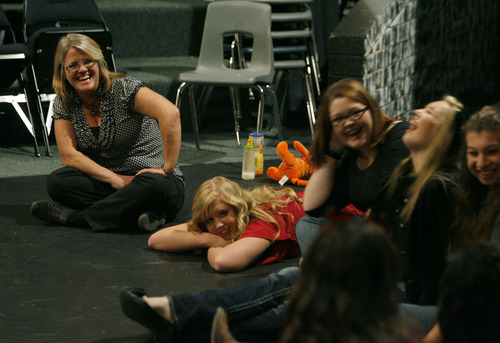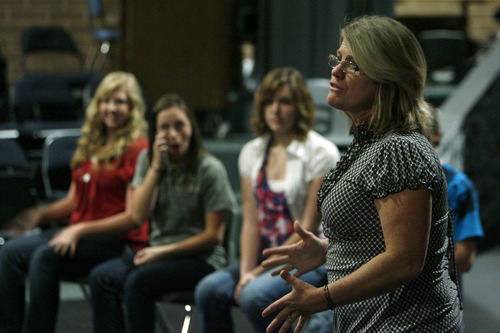This is an archived article that was published on sltrib.com in 2012, and information in the article may be outdated. It is provided only for personal research purposes and may not be reprinted.
Michael Woodruff favored the death penalty at the time he was cast in the role of prison warden in Bingham High School's production of "Dead Man Walking" last spring.
But as the 17-year-old researched his role, he began to rethink his feelings.
He read about wardens and the emotional toll arranging an execution took on some of them. He learned that other wardens felt OK with that responsibility because the punishment had been handed down after a fair trial.
"This play has taught me so much," said Michael, who read the "Dead Man Walking" script to prepare for the play and the book it is based on for a language-arts class at school.
"After reading the play and the book, I was for the death penalty. When I was doing research so that I could play the part of the warden, I realized that I wouldn't be able to arrange for someone else's execution like the warden does. I wouldn't be able to sleep at night knowing that I arranged someone else's death. The play and the book are meant to help you think about the death penalty with arguments for both sides so that you can make your own decision."
That sort of critical thinking is exactly what the Dead Man Walking School Theatre Play Project intends for students staging the play, said Greg Callaghan, national coordinator for the project. The play is based on a book by Sister Helen Prejean, a nun who counseled a condemned killer before he was executed.
—
An issue in Utah • The Jordan School District is embroiled in controversy months after the play's run in March, with some parents and a conservative group criticizing the district for allowing Bingham to stage a play with violent undertones and political subject matter. Supporters of the play have shot back, touting free speech rights and the importance of broaching difficult issues in education.
But what has been lost in the conversation so far are the educational requirements for schools that produce the play.
"Dead Man Walking" has been staged by approximately 220 high schools and colleges across the country since actor Tim Robbins developed the script for theater in 2004, said Callaghan, whose office is based in San Francisco. Two school departments outside of the performing arts must take on the issue of the death penalty in order for schools to obtain rights to stage the drama, he said, so students get a well-rounded education on a touchy subject.
Callaghan, who has been on the job for a year, said he's unaware of any complaints about the play in states other than Utah. Besides Bingham High, the play was produced this academic year at schools in California, Illinois, Washington, New York, Alabama, Pennsylvania, Kansas, Oklahoma, Florida, Indiana, Ohio and Washington, D.C.
Callaghan said the project's goal is to spark a healthy discourse about all facets of the death penalty.
"We know it's an issue that many people don't explore because it doesn't affect them directly," he said. "We hope to get people thinking and talking."
The play seems to have done just that in the Jordan District.
The controversy prompted the Jordan Board of Education this month to clarify the district's stance on the death penalty, consider a public apology and discuss changing its policy for how high school plays are selected.
Board member Carmen R. Freeman has called for more parental involvement in the process. Currently, a school committee of teachers and parents selects the plays. A district committee also weighs in on the decision.
But in the case of "Dead Man Walking," only the school committee met on the topic in an apparent policy oversight. That oversight prompted Freeman to suggest the district hold open forums where the public can comment on a selected drama before a school moves ahead.
The board's discussion of policy changes came in response to criticism by political leaders and parents, most of which surfaced after the conservative Eagle Forum issued a press release in June objecting to Bingham High's performance.
The group claimed the production was laden with profanity, sexual language, violence, racial slurs, bigotry, political bias and "inappropriate use of biblical teachings."
Sen. Aaron Osmond, R-South Jordan, presented board members with a letter imploring the district to apologize for staging the play and suggesting that more parents be involved in the selection process. Osmond also wrote that school productions should not "promote a specific political group" or political ideology and said "Dead Man Walking" had damaged community trust.
Larry Short, South Jordan city councilman, also asked the board to apologize.
—
Not everyone's upset • Other parents, however, don't understand what the uproar is all about.
Robert Woodruff, whose son Michael played the warden in the play, said students and parents were warned about its content. Woodruff said drama teacher Michelle Willden warned ticket purchasers outside the theater that the drama contained adult themes and was not suitable for young children.
Woodruff believes the production was balanced in its portrayal of the complexities of capital punishment.
"I think they fairly represented both sides in such a way that you saw the torture of the family of the victim and the torture of the family of the perpetrator," he said. "The feeling I got was that the perpetrator created a lot of victims, which I think is what the play's [theme] was after."
Willden, who in 2010 received the Excellence in Teaching award from the Utah Education Association, canceled an interview scheduled for Friday, saying the controversy over "Dead Man Walking" has become so volatile.
But she said in a brief telephone conversation Wednesday that parent complaints about high school productions are nothing new, citing concerns over a kiss between students in the musical "South Pacific."
"No matter what we do someone is going to be unhappy because it's art," she said.
Sandy Riesgraf, Jordan School District spokeswoman, has said previously that the district fielded only one complaint about the play before the Eagle Forum issued its news release. More than 700 parents and patrons saw the play and expressed overwhelming support, she said.
Riesgraf said the script was edited for language and content, with permission from the play's author. She said a number of swear words were removed and drama students were told more edits were possible if they were uncomfortable with the language. The student actor in the play's lead role worked with parents and teachers to limit offensive language while preserving the authenticity of the character, she said.
Steve Dunham, another district spokesman, said Friday that it's unknown at this time whether the board will follow through on changing the policy or schedule the issue for more discussion at another study session.
"This has resurfaced four months after the fact," Dunham said of the play controversy. The board, he said, "wanted to review the policy to make sure it covers the bases on everything. I don't know that [the issue] will be brought back up."
For now, student actors at Bingham High are bracing themselves as the controversy continues to unfold. Michael Woodruff said he's excited for next year's play, "Fools" by Neil Simon.
"Personally, I'm OK with people having their criticisms," he said of this year's production. "The play we're doing next year is a comedy, so I guess it might be [less controversial]."
mrogers@sltrib.comTwitter: @mrogers_trib —
To learn more
Visit http://www.prejean.org.





